|
|
|
Sort Order |
|
|
|
Items / Page
|
|
|
|
|
|
|
| Srl | Item |
| 1 |
ID:
149421
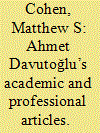

|
|
|
|
|
| Summary/Abstract |
International relations theories have sometimes been criticized as being focused on a narrow set of ideas and values. This article provides a means by which this problem can be addressed by examining the theories of former Turkish Prime Minister Ahmet Davutoğlu, who, prior to joining the government, was an international relations scholar. The article argues that gaining a greater understanding of Davutoğlu’s academic and professional publications is valuable not only to scholars interested in studying Turkey, but also to the study of international relations. Distinguishing him from other thinkers, Davutoğlu’s models are a combination of Islamic values, civilizational theories, and constructivism.
|
|
|
|
|
|
|
|
|
|
|
|
|
|
|
|
| 2 |
ID:
149426
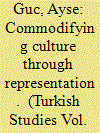

|
|
|
|
|
| Summary/Abstract |
This paper attempts to analyze two intertwined discourses on Mardin’s urban space that commodify its culture by representing it as an ideal place of living together. First is the official discourse which constructs an image for Mardin as a city of tolerance and belief, and second is the demotic discourse of the Mardinites which appropriates and contests this image. By describing these discourses, the paper intends to indicate the hiatus between the reality of Mardin’s locality and its representation. The paper argues that the discourses commodify Mardin’s cultural traits and strengthen local power relations by reproducing its urban space.
|
|
|
|
|
|
|
|
|
|
|
|
|
|
|
|
| 3 |
ID:
149428
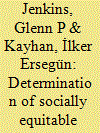

|
|
|
|
|
| Summary/Abstract |
In toll-road projects there is exogenous demand risk. Thus, the government may be required to provide a minimum-traffic guarantee to induce potential private partners to participate. The government must offer the most appropriate level of guarantee while also justifying this controversial fiscal policy tool to society. This study demonstrates the use of financial modeling, risk analysis, and economic evaluation in a toll-road project in Turkey, contributing to the narrowing of a capacity gap in the field. One criterion is proposed to produce a socially equitable guarantee level. This case study exemplifies the policy implications discussed in the conclusions, with a critical look at the public–private partnerships within the context of the neoliberal economic development theory.
|
|
|
|
|
|
|
|
|
|
|
|
|
|
|
|
| 4 |
ID:
149429
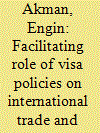

|
|
|
|
|
| Summary/Abstract |
This study is focused on the direction and magnitude of visa policies on bilateral trade and foreign direct investment (FDI), both of which often necessitate in-person contacts. Visa restrictions hinder cross-border travel deterring potential visitors and producing an inimical effect on trade and FDI. Liberal visa policies facilitate business travels and encourage companies engaging in international trade. This article analyzes the impact of visa restrictions using gravity-type models for the period of 2000–14 on the exports and FDI of Turkey. A panel data fixed-effects model helps elucidate time-variant and country-idiosyncratic characteristics of visa policies. The estimations indicate that visa restrictions have a significant negative effect on both trade and FDI. Two-step cluster analysis is also utilized to segment countries depending on the visa-free travel their citizens enjoy employing the Henley & Partners Visa Restrictions Index. Results suggest that effects of visa restrictions are higher for countries having higher travel
|
|
|
|
|
|
|
|
|
|
|
|
|
|
|
|
| 5 |
ID:
149423
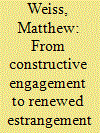

|
|
|
|
|
| Summary/Abstract |
Over the last several years, the political will of the governing AKP in Turkey to make the historic compromises necessary to complete the peace process with the Kurds has sharply declined. This paper will examine the causes of the breakdown in the Turkish-Kurdish peace process and the Turkish government’s lurch in a nationalist direction in its approach towards the Kurdish minority from the standpoint of ‘securitization’ theory. The key catalysts, it is argued, for the re-emergence of a securitization paradigm in Turkey’s handling of the Kurdish issue are: (1) Turkey’s stalled bid for accession to the European Union; (2) the intensifying electoral competition between AKP and the Kurdish movement parties, coupled with the instrumentalization of the Kurdish peace process to serve President Recep Tayyip Erdoğan’s quest to install a dominant presidential system and (3) the spillover effects of Syria’s civil war on Turkey’s relations with its own Kurdish populace.
|
|
|
|
|
|
|
|
|
|
|
|
|
|
|
|
| 6 |
ID:
149427


|
|
|
|
|
| Summary/Abstract |
In examining the Turkish response to the crisis of the 1930s, this paper contributes to existing literature at three levels: economic policy conception, comparative case selection, and mode of explanation. First, it takes a holistic approach to economic policy (neomercantilism) by looking at its foreign trade and finance (autarkic), microeconomic (etatist), and macroeconomic (neoclassical orthodox) dimensions. Second, it locates the Turkish response in the Balkan context, where other small states responded to comparable stimuli. Third, while viewing the macroeconomic conservatism of Turkish neomercantilism as a situational necessity, it explains the autarkic dimension by the shared German metropolitan linkages of the Balkans as a region, and the etatist dimension by the Kemalist bureaucracy’s larger room for maneuver in a context of wider gap between political modernization and economic backwardness.
|
|
|
|
|
|
|
|
|
|
|
|
|
|
|
|
| 7 |
ID:
149422


|
|
|
|
|
| Summary/Abstract |
Political ideology is often characterized along a liberal–conservative continuum in the United States and the left–right continuum in Europe. However, no study has examined what this characterization means to young Turkish voters or whether it predicts their approach to morality. In Study 1, we investigated in two separate samples the relation between young Turkish participants’ responses to the one-item left-to-right political orientation question and their self-reported political ideologies (conservative, socialist, etc.). In Study 2, we investigated the relation of moral dimensions as defined by Moral Foundations Theory to political party affiliation and political ideology. Results revealed that CHP, MHP, and AKP voters display a typical right-wing profile distinct from HDP voters. Findings regarding political ideology measures were consistent with party affiliations. Taken together, the findings reveal the distinctive nature of young Turkish people’s political orientations while supporting the predictive power of the one-item political orientation question.
|
|
|
|
|
|
|
|
|
|
|
|
|
|
|
|
| 8 |
ID:
149424


|
|
|
|
|
| Summary/Abstract |
How do pro-Islamic parties evolve during their incumbencies as opposed to their years in the opposition? Adapting a most different systems approach, this study will discuss this question by looking at the similar political evolution of two incumbent pro-Islamic parties, the AKP and the PJD, in two different political contexts, that of secular democratic Turkey and of authoritarian Morocco where the King claims Islamic legitimacy. Borrowing from the literature on populism in Europe and in Latin America, this study will test the expectations of the inclusion-moderation literature for incumbent pro-Islamic parties. It will argue that incumbent pro-Islamic parties have evolved into populist parties that (1) combine a thin-centered understanding of political Islam with other ideologies in order to consolidate their electoral appeal among diverse constituents and (2) see themselves as the representatives of a marginalized majority, adapt anti-elitism, and engage in political reforms in the name of bringing the will of the majority into power.
|
|
|
|
|
|
|
|
|
|
|
|
|
|
|
|
| 9 |
ID:
149425
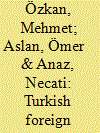

|
|
|
|
|
| Summary/Abstract |
This article is an attempt to answer a number of questions asked in the literature on radicalization and extremism: What motivates foreign terrorist fighters (FTFs) from Turkey to join the Islamic State of Iraq and Syria (ISIS)? In what kind of environment does violent extremism become the choice for Turkish nationals to join ISIS in Syria and Iraq? How can Turkish nationals who join ISIS be profiled in terms of their socio-economic and cultural traits and how do these traits compare people from other nations who join and fight in terrorist organizations? Though their numbers remained minimal compared to the overall population, how can we explain the case of Turkish FTFs, when a peaceful and tolerant ‘Anatolian/Sufi Islam’ has reigned in the country and Muslims are well integrated in the social, economic, and political life of the country under the 13-year long rule of Islamic-oriented Justice and Development Party (AK Party)? What do these answers to these questions mean for Turkish Islam and possible de-radicalization programs? These questions will be addressed by semi-structured interviews conducted both with Turkish FTFs who have joined ISIS and with family members of some of those who have returned from fighting with ISIS.
|
|
|
|
|
|
|
|
|
|
|
|
|
|
|
|
|
|
|
|
|